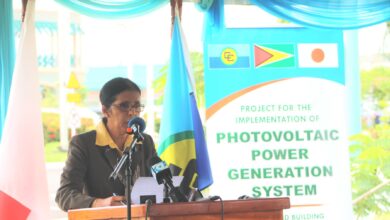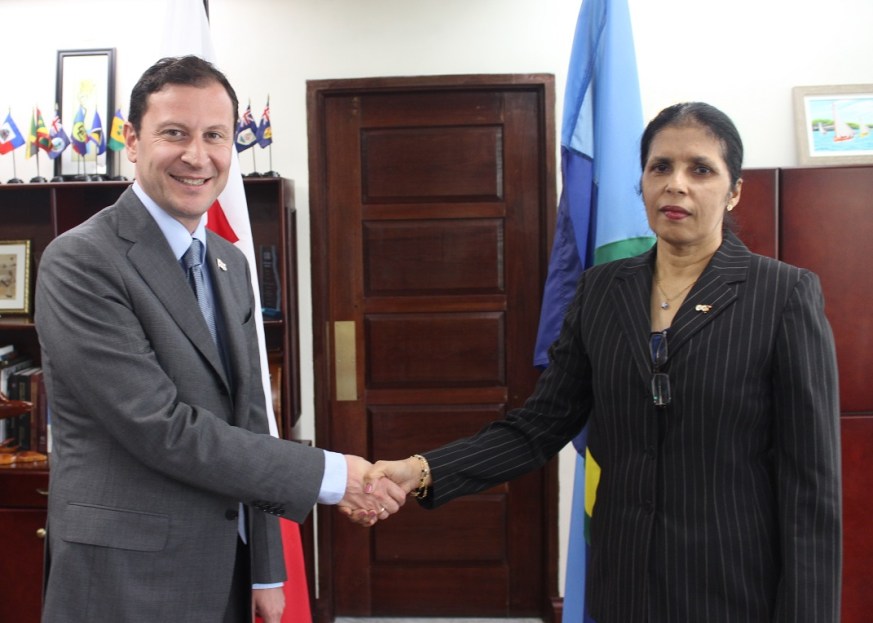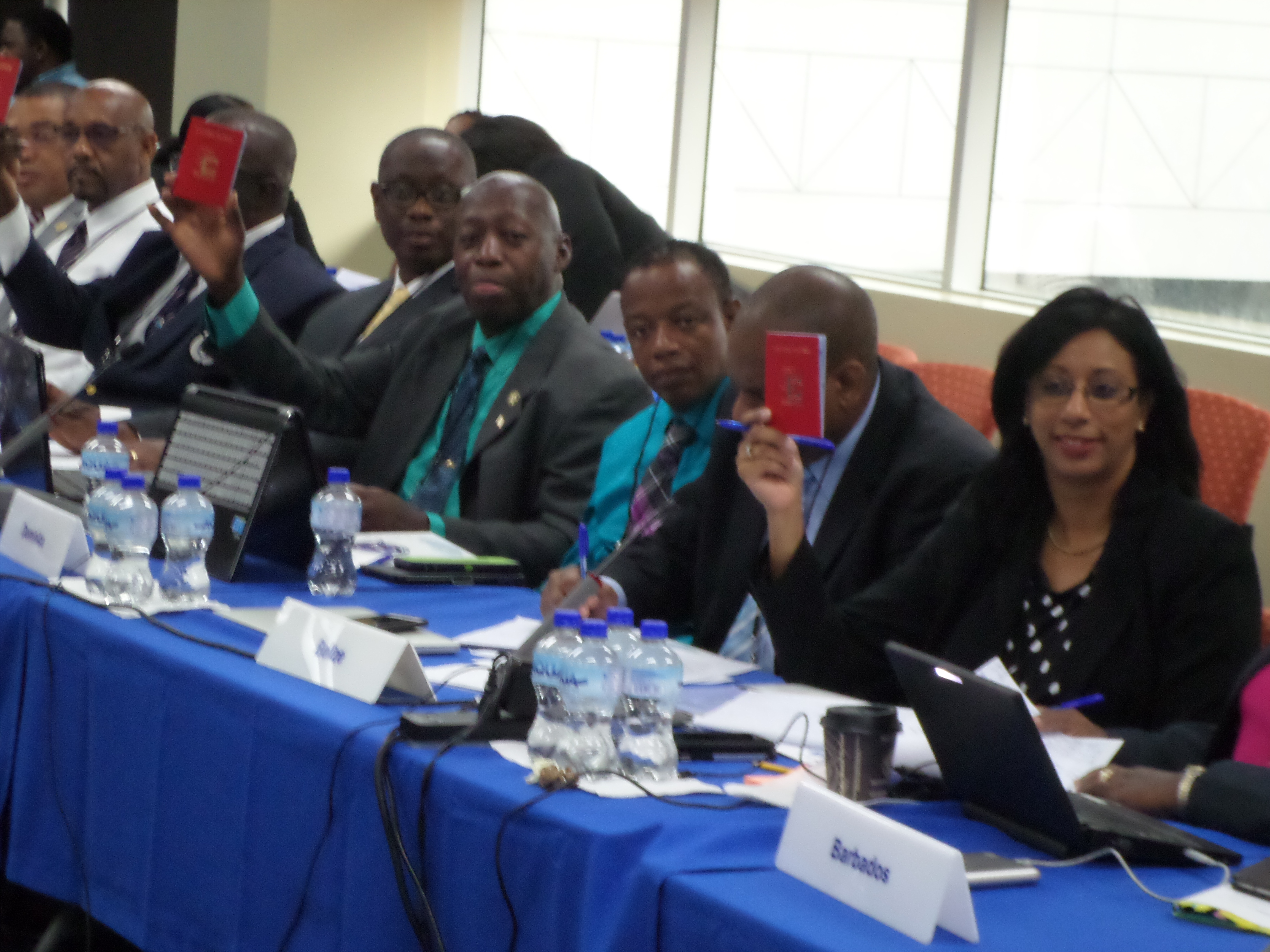Honourable Honourable Karl Samuda, Minister of Industry, Commerce, Agriculture and Fisheries of Jamaica;
Ministers and other Heads of Delegations;
Distinguished Delegates;
Representatives of the Media;
Ladies and Gentlemen.
It is my pleasure to welcome you all to the 42nd Meeting of the Council for Trade and Economic Development (COTED).
In so doing, I extend a special welcome to the Honourable Karl Samuda, Minister of Industry, Commerce, Agriculture and Fisheries of Jamaica on his return to the Council. I am sure his experience will be of great value to the discussions to follow.
I also wish to acknowledge the presence of the Executive Director, of the International Trade Centre, Ms. Arancha Gonzalez. The Centre has been of great value to our Member States and her presence here is indicative of its continuing interest in our development.
Honourable Ministers, the Agenda may have a familiar look but the matters speak to a number of important issues facing the Community. Regardless of whether these issues relate to trade in goods or services, movement of persons, or the establishment of business across the single market, it is essential that the COTED remains vigilant to the need to protect the integrity of our Treaty arrangements.
Further, it is essential we ensure that the administrative structures that are required to give effect to the legal arrangements are functioning properly. This is the only way to minimise or eliminate the obstacles that arise from time to time in the conduct of our integration affairs. The people of the Region have a right to expect consistent application of the rules governing our arrangements as they seek to enjoy the benefits of integration.
The issue of the treatment of CARICOM nationals as they travel throughout the Community is one that continues to generate discussion. As the Secretary-General had cause to say not long ago, the average citizen judges CARICOM on the extent to which he or she is able to move freely throughout the Region and engage in their legitimate activities without being hassled at our various borders. It is clear that more sensitization has to be done among our border officials in relation to the rules that are already in place and the procedures that should be followed. At this meeting, therefore, Ministers, you may wish to consider establishing a quick-response mechanism to resolve situations as they arise on the ground.
A key element of our integration is the CARICOM Single Market and Economy (CSME). This has been identified as our platform for growth and development and its role is further emphasised within the Community’s five year Strategic Plan. The acceleration of implementation and use of the CSME is one of the high-priority areas which our Heads of Government singled out for focused implementation during the period of the Plan. It is the bedrock of our economic resilience.
This meeting will have the opportunity to assess how we are positioning ourselves to derive the optimum benefit from the implementation of the CSME to drive growth and development within our Member States. It is important that, as Ministers, you give your perspectives both on the extent to which the current CSME framework has been fulfilling the objective and how it can be enhanced to have a greater impact on the lives of the population at large.
In other words, how do we achieve a more effective and efficient operation of the CSME remembering that it is a tool to be fashioned and used to benefit the people of our Community. Our people want to see results. The consolidation and enhancement of the operations of the Single Market will also allow for a more coherent approach in our External Trade Negotiations.
The importance of that approach is heightened as the Community assesses its options following the 10th World Trade Organisation Ministerial Meeting held in Nairobi, Kenya last December. There are a number of issues in the Post-Nairobi Agenda which require close scrutiny and it may be necessary to have a special session of this Council dedicated to devising strategies on WTO-related issues as well as the wider multi-lateral trading system.
In that context, I look forward to the commencement of the comprehensive review of the Common External Tariff (CET) and all its related instruments. The completion of that review should hasten its realignment in keeping with our obligations under the rules of the WTO.
One of the broader economic issues that we need to pay more attention to as a Region, is the ease of doing business. We are all complaining in our Region, but what is each one of us doing to change the situation. We know that, globally, there is a strong correlation between high levels of economic growth and the ease with which economic actors can conduct their operations. CARICOM Member States tend to fall somewhere in the middle of the global rankings for ease of doing business.
Improving our ratings could enhance our prospects for regional and foreign investments and it is a good signal that we have embraced the WTO Trade Facilitation Agreement, an agreement that seeks to reduce red tape at the borders, on a global basis. But there are many other issues that the Region could agree to address jointly, for example, in relation to the time taken to start a business, registering property, and the enforcement of contracts.
Honourable Ministers, the COTED is probably the most active of all the CARICOM ministerial councils. It convenes in various configurations, as the regular meeting (as is the case today) and in subject-specific formats. The remit of the COTED, which is the promotion of trade and economic development of the Community, finds its expression in a large number of Community arrangements, processes and programmes. It is important, however, to remember that the ultimate goal is the economic development of our populations and thus, all these arrangements and initiatives must be evaluated on that basis. Let that be our guide as we proceed with deliberations over these two days.
I thank you.





